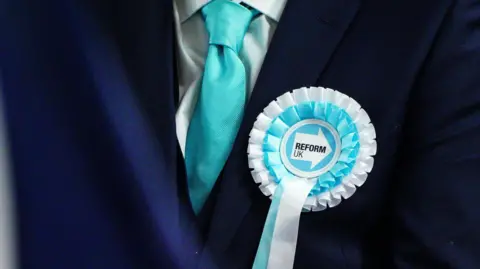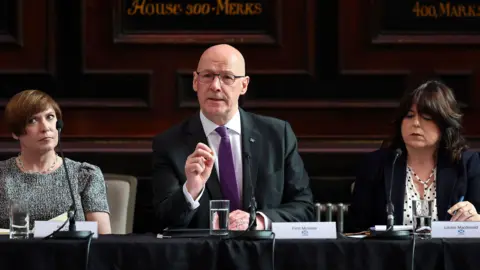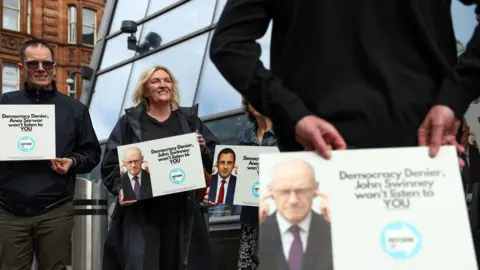Will Scotland be next to feel rise of Reform UK?
 PA Media
PA MediaReform UK are the talk of the political steamie following their breakthrough results in England's local elections.
Are they poised to make similar inroads in Scotland?
There had once been a temptation among some of Scotland's political classes to write off Nigel Farage's Reform - and the Brexit Party and UKIP before them - as chiefly an English phenomenon.
But when you start to add up the numbers, their presence feels like a real thing.
A million people in Scotland voted Leave in the EU referendum in 2016, and the Brexit Party went on to finish second in the European Parliament elections here in 2019.
In last year's general election Reform took 7% of the vote - not enough to win any seats, but a serious chunk of the vote for a newly formed vehicle.
The party is still establishing basic infrastructure north of the border, but demonstrated its intent by standing in every constituency across Scotland - something which even familiar parties like the Greens did not do.
Looking at council by-elections since then, Reform has already secured a dozen third-place finishes.
They have also been picking up significant shares of the vote in areas which are far from Conservative strongholds, suggesting a broader appeal than just disaffected Tories.
Although its strongest performance was in Fraserburgh - part of the most Leave-leaning part of Scotland - the party seems to be doing particularly well in the central belt.
They took 24% of the vote in one contest in Glasgow, 23% in Stirling, 18% in Fife, and 19% in two West Lothian seats.
The party's average result across Scotland from almost 30 local by-elections has been over 12% of the vote.
Again that does not translate into seats in these first-past-the-post contests, for all that Reform does now have several councillors via defections from the Tories.
But it is comfortably enough to win multiple seats in next year's Holyrood election, which uses a form of proportional representation.
And they are already being talked about by the parties currently represented in Edinburgh.
 PA Media
PA MediaJohn Swinney's bid to build bridges across parliament has been characterised by some ministers as the beginnings of coalition against Reform, before they have even arrived.
The first minister singled them out when he was talking about the motivations behind his "anti-far right" summit in Glasgow too.
Reform notably were not invited to the event, but turned up outside anyway.
Some have argued that Swinney's snub provided them with ample free publicity and a vivid illustration of the outsider status they want to project.
Ultimately the SNP leader may have calculated that Reform are more likely to take votes from the Conservatives and Labour, so there is little electoral harm for him in that.
But the conditions do seem fairly ripe for an anti-establishment party to burst onto the scene at Holyrood.
The SNP are seeking to reinvent themselves again under Swinney, but they will have been in power for 19 years come next May.
The Tories have just completed a lengthy stint in Downing Street, and Labour are hardly enjoying a honeymoon period.
And if you think about the wider factors which drive populist movements, they are only intensifying.
The world gets more complicated by the day, and people are growing increasingly anxious and disillusioned.
Movements which say they are listening to those concerns and offer answers - whatever agenda they may ultimately suit - prove popular for a reason.
The real challenge for leaders like Swinney and Sir Keir Starmer is to find ways to deliver for voters in a way that satisfies their concerns.
 PA Media
PA MediaThe challenge for Reform meanwhile is to maintain their current momentum.
Can their somewhat nebulous brand survive contact with actually being in positions of authority?
Come 2026 the party will have to have fleshed out policy positions far more than their current vague message about shaking things up and taking on the establishment.
They will need a manifesto with concrete policies on things people care about more than just sending a message - like the NHS.
Labour have already started to home in on Farage's comments about the health service.
And with far more elected representatives set to take to the airwaves, people are going to have a far better idea of what Reform actually stands for.
We are about to have a year of hype in the buildup to the Scottish and Welsh parliamentary elections, so voters will go into the polling booths with their eyes open.
It will be for them to decide whether the Reform bandwagon keeps rolling.
